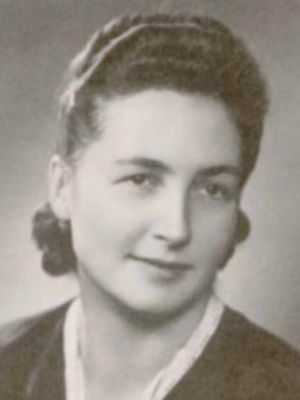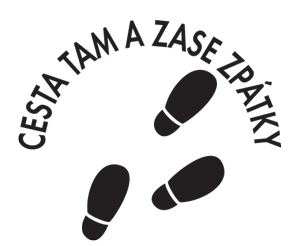The Extraordinarty Story of an Ordinary Woman - The Story of Ms. Chalupová
 Before the arrest
Before the arrest
Marie Chalupová grew up in the countryside, in the village of Liboměřice, together with five siblings. Her parents owned a farm there and worked tirelessly to pay off debts and to be able to afford education for the children. „Then came the year 1948 and suddenly, they were robbed of everything they worked for, years and years of hard work. They were utterly bereaved because neither mom nor dad received any pension, not a single Crown. Had my brother, at whose place they lived, not taken care of them, they would have starved to death. That they had nothing to live on apparently didn't matter to anyone.“ It took two years before they were given permission to pick cherries from their own orchard – at that time, they were allowed to sell them for one Crown per kilogram. Her brother loved horses – these, too, were confiscated. „My brother was fervently attached to his horses. Imagine they took them away from him and sent them to the slaughterhouse. Horses were no use any more in the fifties – there were tractors. Can you imagine the pain? I could not come to terms with it. Simply could not,“ recalls Ms. Chalupová.
Marie Chalupová studied at a social law school and became a kindergarden teacher. She did not accept the new regime and refused to become a member of the Party. First, a friend tried to persuade her to change her mind, then the director of her school, but she didn't give in.
Arrest
Ms. Chalupová lived in a flat in the kindergarden in Pískovní Lhota near Poděbrady where she worked. And that's where the police arrested her in 1949. They searched the flat and took all her letters and other documents. On that day – May 5, 1949 – they took her to the infamous detention prison in Bartolomějská Street in Prague. According to the law, an arrested person could be held there for 48 hours at the longest; in spite of that, Ms. Chalupová stayed there until January 1950.
The detention prison was renown for cruel interrogations – they were protracted and comprised physical violence.
There were sixteen women in our cell, with only four straw beds to sleep on. Not all were political prisoners, just three, actually. In 1949, prisons weren't provided with prisoner uniforms yet, so we all wore civillian clothes. My sister sent me a skiing kit, navy blue, made of wool. I wore it all the time. When I came back from an interrogation all the other women saw how they've beaten me. The blows made visible marks on my clothes. That night, I was taken care of by the prostitutes and had one of the beds all for myself...“
“Once dad brought clean laundry and I asked him: 'Daddy, how is Mom?' And he says: 'It's better now, but in September, we thought she was going to lose her mind. It was so horrible, you can't imagine.' In September, I went through all those horrible interrogations. Once, it became so excrutiating that I kept saying to myself in my mind: 'Mommy, I can't stand this. They will beat me to death.' Later, mom came to visit me in Železovce and said: 'I heard you. You said: »Mommy, I can't stand this. They will beat me to death.« Did you? I heard you!' And I said: 'I did.' The emission of thoughts was so strong that mommy heard my voice. The memory of her was extremely powerful and helped me very much.
From the detention prison, Ms. Chalupová was transferred to the court of justice prison at Pankrác. She was to wait there for her trial. Incidentally, the execution of Dr. Milada Horáková took place at the same time. „Horáková was executed. It was cruel. I was assigned to seamstressing then. There were twenty-two of us and we all knew she was going to be executed. At four o'clock in the morning. The prisoners to be executed were always led to the gallows alongside the seamstressing block. That night, we didn't sleep at all. As soon as we heard the dogs and the sound of footsteps in the sand – all the walkways were sanded – we dropped on our knees and prayed. All of us. It was horrendous...“
Ms. Chalupová was tried as a member of Štěpán Gavenda's group. Gavenda was an agent-courier delivering messages and information across the border to the West. „I was accused of high treason. That was absurd. We were raised – at home, at school and in Sokol – to love our homeland. Homeland meant a lot to us. You couldn't betray your country. That was inconceivable...“ The prosecution proposed death sentence. The final verdict was 15 years of prison. Marie Chalupová spent 9 years in various prisons and was then released on a 10 year parole.
Prison
From Pankrác they moved her to Česká Lípa and later to Pardubice. From there, she was transported to Železovce in Slovakia. Prisoners were often subjected to forced labor. Marie worked in agriculture, especially on tobacco plantations where her task was to pick tobacco leaves, dry them and put them on a string. She recalls that civillian employees often stole the tobacco and, consequently, the prisoners did not meet the daily norms. They also stole some of the prisoners' food which was scarce and poor even as it was. Soup, for example, was just heated water with paprika in it. The prisoners protested against such food and prefered food to be sent to them from the prison rather than this... Then an epidemy of jaundice broke out in Železovce; Ms. Chalupova got infected, too. She was taken to a hospital in Illava and then back to the prison in Pardubice. Here, also, she worked as seamstress.
It took nearly nine years before her case was reconsidered by a commitee and released on parole. „It was mom who came to pick me up then,“ she recalls. „She waited for me since the morning and then she told me: 'I pleaded to all the martyrs of Zámeček for your release.' There's a place called Zámeček (Little chateau) in Pardubice where the Germans executed people from Ležáky, a village burned down during the Second World War. That is how mom brought me home.
Everything seemed so strange to me. I looked around as if startled. Mom was very unhappy about me standing in front of the window all the time, but I couldn't help it. It was so weird that there were no bars in the windows and that I could move around freely and look out of the window.
Free again
After her release, Marie moved in with her sister in Nýrsko and worked as a lens polisher in the Okula factory. However, she was not left unsurveilled by the State Security. Her fiancé escaped from Leopoldov, one of the harshest prisons, and succesfully crossed the border. He made the entire journey from Ústí nad Labem to Berlin on foot, and in Berlin he managed to get into its Western part. From there, he headed for the USA. Marie was arrested again and interred at Litoměřice on the grounds of an alleged plan to follow her fiancé out of the country. František Chalupa, her fiancé's brother, was arrested too. They decided to marry; fortunately, that averted the charge – people who plan a wedding do not plan to escape the country. They spent the next 51 years together. However, she was not allowed to return to her previous profession at the maternity school. At first, she worked as an auxiliary hand at the kindergarden and, having earned a certificate for cook-waitress, she worked as a cook in the school until she retired.


 Before the arrest
Before the arrest































